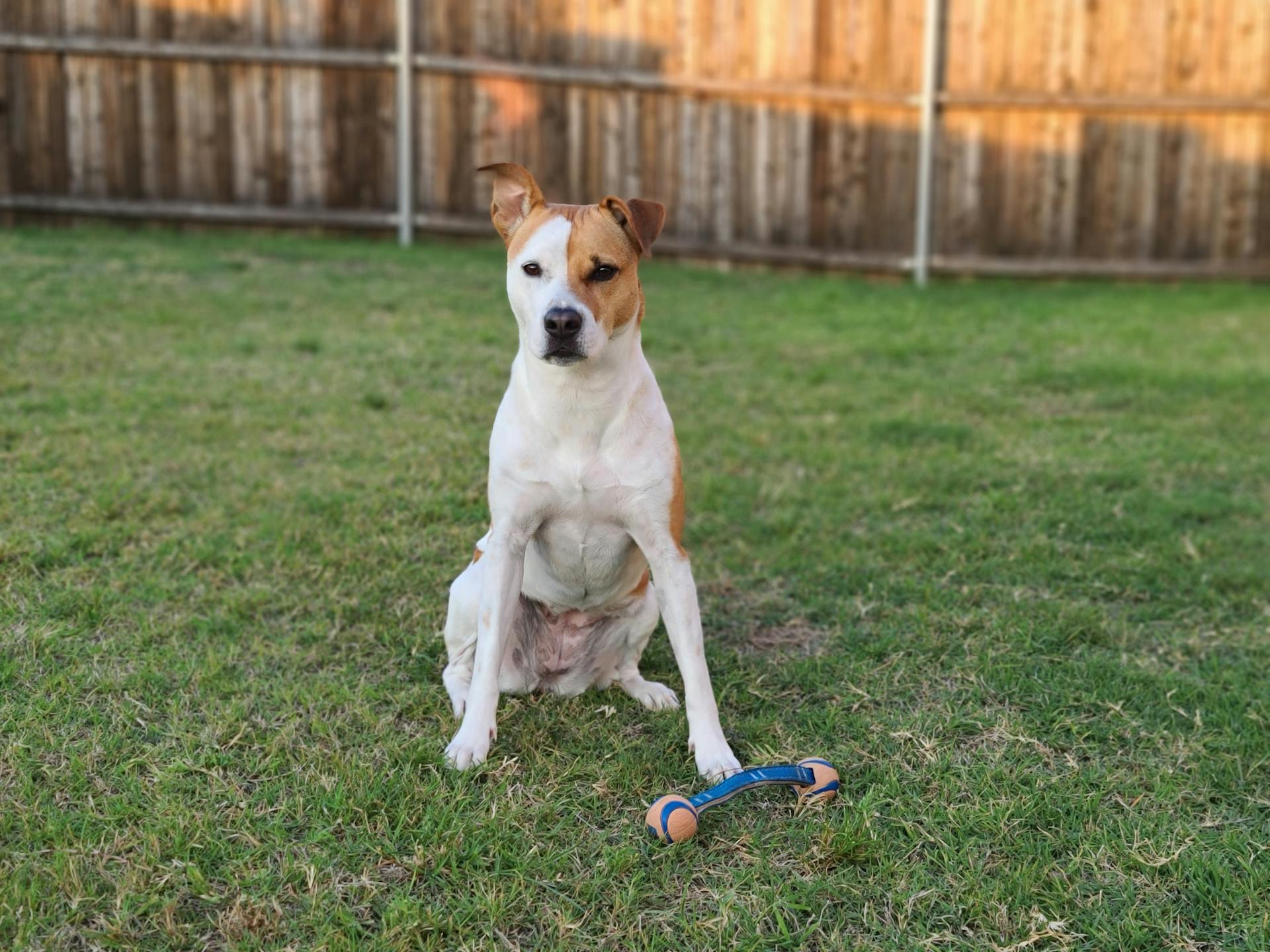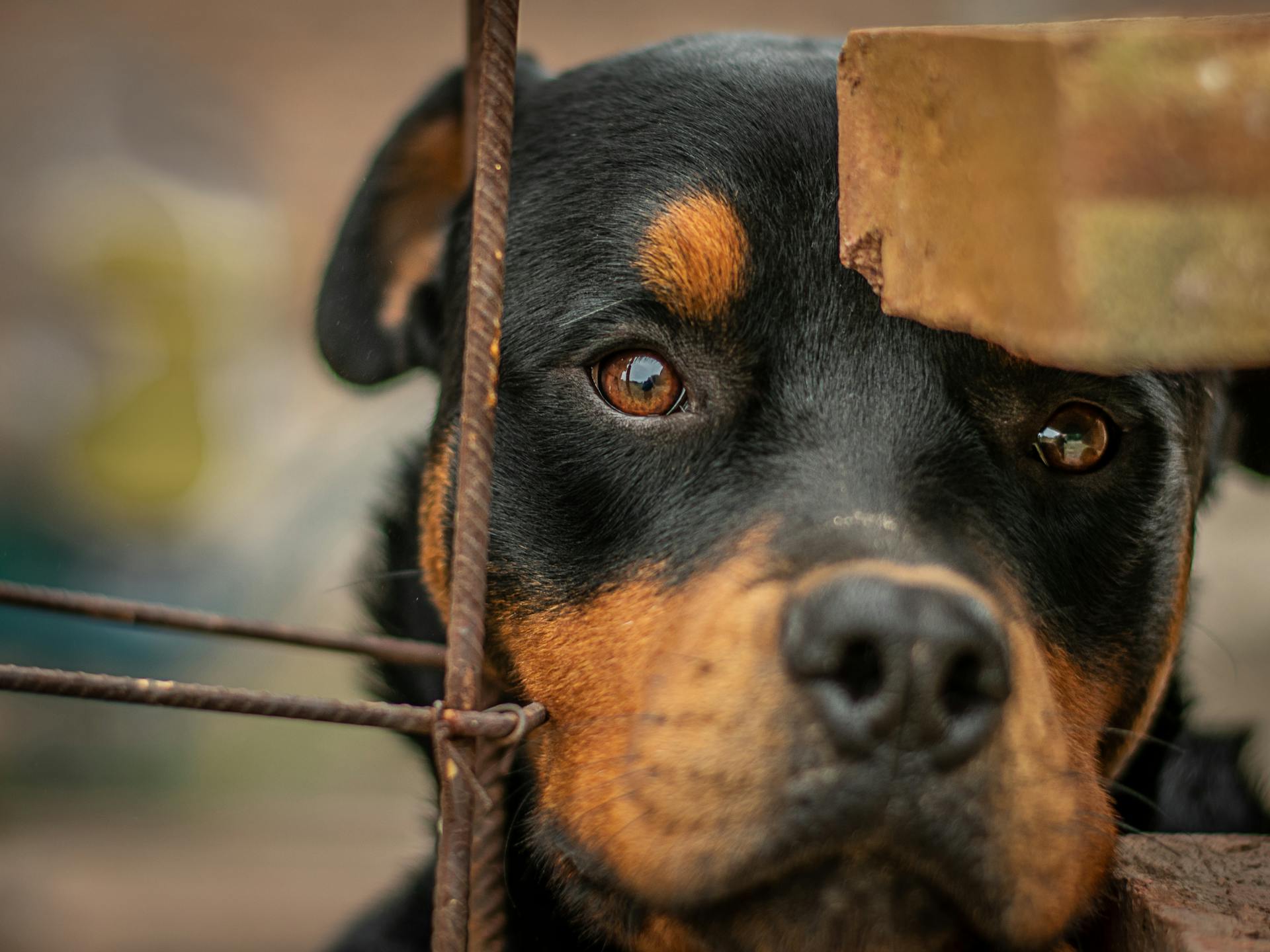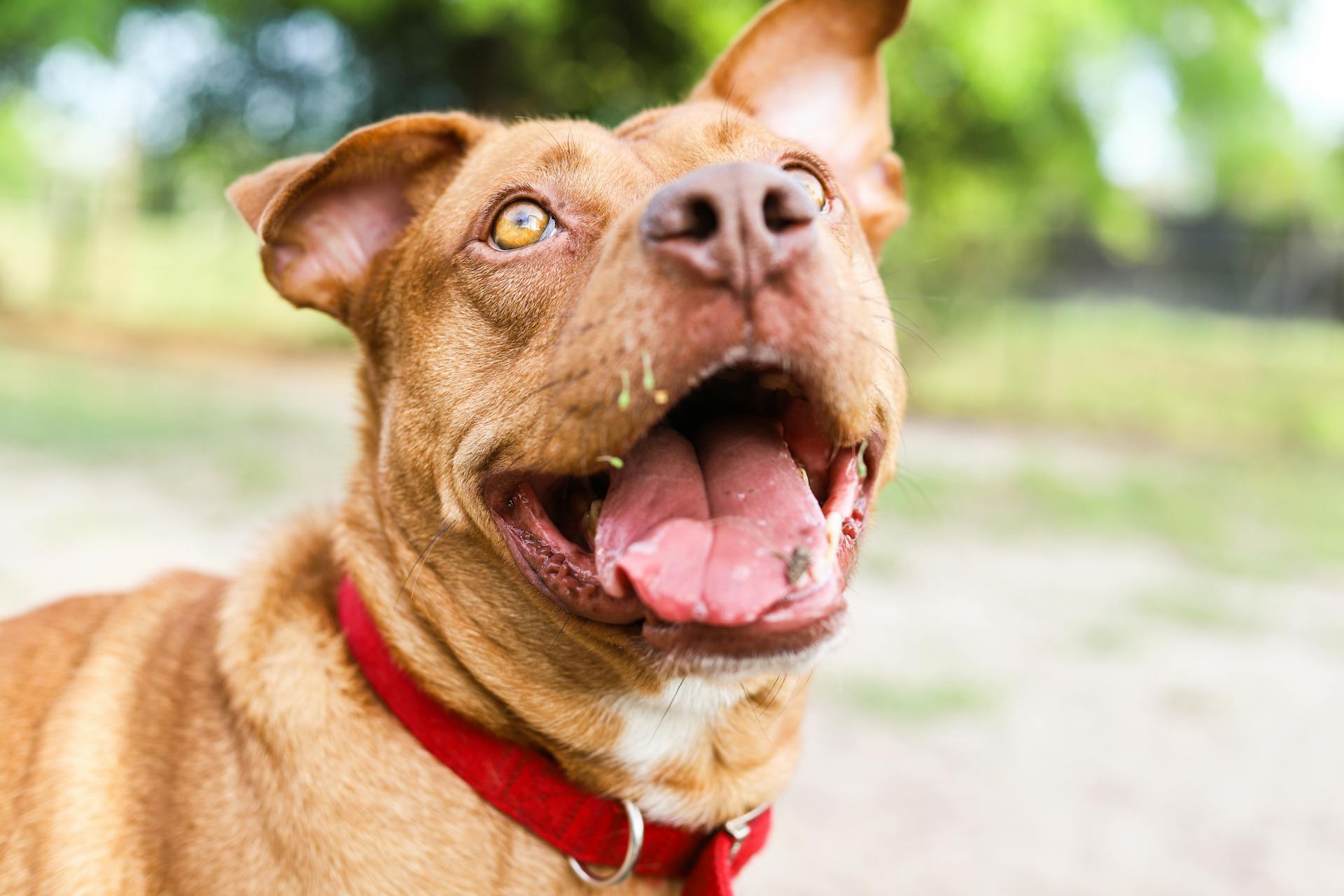
In Florida, pit bulls have been banned in many cities, leading to a heated debate about Breed-Specific Legislation (BSL). BSL is a policy that restricts or bans specific breeds of dogs, in this case, pit bulls.
Pit bulls have been stereotyped as aggressive and violent, but this is not entirely accurate. According to a study, 85% of fatal dog attacks in the US are not caused by pit bulls, but by other breeds.
Many cities in Florida have implemented BSL, with Miami-Dade County being one of the earliest adopters. The county's BSL was enacted in 1989 and has been in place ever since.
Despite the ban, many pit bulls are still found in Florida, often in shelters and rescue organizations.
See what others are reading: 10 Reasons Why Pit Bulls Should Not Be Banned
Arguments for BSL
BSL makes communities safer by regulating breeds with a genetic propensity to attack and inflict severe injuries.
Enacting BSL can avert first attacks by these breeds, which often result in severe injury or even death.
According to DogsBite.org, 346 deaths between 2005 and 2019 were attributed to pit bulls alone.
Data shows at least 521 deaths due to dog bites during that period, with pit bulls being responsible for nearly two-thirds of those fatalities.
Prior to BSL enactment in Prince George’s County, Maryland, there were 853 dog bites reported in 1996, with 108 of those bites coming from pit bulls.
After 14 years of the ban, overall dog bites decreased by 43% and pit bull bites were down 35%.
BSL can also help discourage pit bull breeding and fighting by preventing more pit bulls from being bred and confiscated.
Only about 20% of pit bulls are sterilized, compared to 80% of all other dogs.
Bans of pit bulls can prevent more pit bulls from being bred, thus reducing the number of dogs that end up in shelters and are euthanized.
For another approach, see: Do Pit Bulls Attack More than Other Dogs
Arguments Against BSL
BSL has been shown to be ineffective in making communities safer. In Miami-Dade County, Florida, which has had a pit bull ban since the 1980s, the county still euthanizes about 800 illegally owned pit bulls per year.
People who are breeding or training dogs for illegal fighting or to protect illegal activities will simply turn to another dog breed if pit bulls are banned. Following a pit bull ban in Council Bluff, Iowa, Boxer and Labrador Retriever bites increased, as did overall dog bites.
BSL also causes problems for people who use pit bulls as service dogs, as they are not always excluded from breed bans and may be confiscated and put down.
A fresh viewpoint: Why Do People like Pit Bulls
BSL Does Not Make Communities Safer
Miami-Dade County, Florida, has had a pit bull ban since the 1980s, yet they still euthanize about 800 illegally owned pit bulls per year.
BSL treats the result (a dog bite) instead of the cause (bad animal owners), making it ineffective.
Aragon, Spain, saw no changes in dog bite numbers five years before and five years after BSL was enacted.
In Council Bluff, Iowa, a pit bull ban led to an increase in Boxer and Labrador Retriever bites, as well as overall dog bites.
A unique perspective: Female Pit Bull Terrier
Winnipeg, Canada, banned pit bulls, only to see Rottweiler bites increase, and then decrease when the law was changed to be breed-neutral.
BSL is often challenged in court, but most cases have been unsuccessful due to the law being rationally related to a legitimate government goal.
These challenges have caused problems for people who use pit bulls as police, guide, or other service dogs, as they are not always excluded and in some cases are confiscated and put down.
Ontario Legal Challenges 2007-2009
In Ontario, Canada, a notable legal challenge to Breed-Specific Legislation (BSL) occurred between 2007 and 2009. The case of Cochrane v. Ontario (Attorney General) made its way through the courts, with Catherine Cochrane suing the Province of Ontario to prevent enforcement of the Dog Owner's Liability Act (DOLA) ban on pit bull-type dogs.
The lower court judge ruled that the DOLA ban was not overbroad because the evidence showed a "reasoned apprehension of harm" from pit bulls. However, the judge found the term "a pit bull terrier" to be unconstitutionally vague, as it could include an undefined number of dogs similar to the American Pit Bull Terrier, American Staffordshire Terrier, and Staffordshire Bull Terrier.
A fresh viewpoint: Pitbull Percentage of Dog Population

The Court of Appeal for Ontario reversed the lower court's ruling, agreeing that the "overbreadth" claim failed because the legislature had acted on a "reasonable apprehension of harm". It also disagreed with the lower court's finding of vagueness, restoring the original wording of "pit bull terrier" on the basis that it was sufficiently precise in context.
The government's ability to introduce a veterinarian's certificate certifying a dog as a pit bull was a key issue in the case. The lower court had found this to be an unconstitutional burden of proof on the defendant, but the Court of Appeal reversed this decision, ruling that it was only a tactical burden if the defendant failed to answer the claim.
The Supreme Court of Canada declined to hear further appeal of the case, effectively upholding the Ontario ban on pit bulls.
Here's an interesting read: Pitbull Dog Ban Ontario
Background and Context
In the United States, approximately 550 jurisdictions have enacted breed-specific legislation in response to incidents involving pit bull-type dogs.
These jurisdictions have taken various actions, ranging from outright bans on pit bull-type dogs to restrictions and conditions on ownership.
Some governments have established a legal presumption that a pit bull-type dog is prima facie a legally "dangerous" or "vicious" dog.
In response to these actions, 16 states in the U.S. have prohibited or restricted the ability of municipal governments within those states to enact breed-specific legislation, though these restrictions do not affect military installations.
Expand your knowledge: Banned Dog Breeds Usa
Background
Jurisdictions in the United States and Canada have the right to enact breed-specific legislation, although the effectiveness of such laws is disputed.
Approximately 550 jurisdictions in the United States have enacted breed-specific legislation, often in response to incidents involving pit bull-type dogs.
These laws can range from outright bans on pit bull-type dogs to restrictions and conditions on ownership, establishing a legal presumption that these dogs are dangerous or vicious.
In the United States, 16 states have prohibited or restricted the ability of municipal governments to enact breed-specific legislation, although military installations within these states may still enforce such laws.
Some governments, like Australia, have taken a more comprehensive approach, banning the import of specific breeds and requiring existing dogs to be spayed or neutered to slowly eliminate the population.
You might like: Laws on Pit Bulls in California
Federal Courts
Federal Courts play a vital role in the US judicial system, with the Supreme Court being the highest court in the land. The Supreme Court has the final say on matters of federal law and the Constitution.
The Supreme Court typically consists of nine justices, who are appointed by the President and confirmed by the Senate.
The Supreme Court's decisions are binding on all lower federal courts, which include the Courts of Appeals and the District Courts.
These lower courts have jurisdiction over a wide range of cases, including civil and criminal matters.
The Courts of Appeals review decisions made by the District Courts and can also hear appeals from administrative agencies.
The District Courts, which are the trial courts of the federal system, have jurisdiction over cases involving federal laws and the Constitution.
The federal court system is designed to provide a fair and impartial forum for resolving disputes and interpreting the law.
Florida-Specific Information
Florida has a unique set of laws regarding pit bulls. The state has a breed-specific legislation that restricts the ownership of pit bulls in certain cities and counties.
In Miami-Dade County, for example, pit bulls are considered a public health and safety risk, and owners are required to obtain a permit and liability insurance.
The law in Miami-Dade County also requires pit bulls to be muzzled and leashed when in public.
Recommended read: Are Pit Bulls Illegal in Miami
Dogs on Florida's List
Florida has a list of dogs considered dangerous under state law. Regardless of breed, a dog is considered dangerous if it has aggressively bitten, attacked, or endangered a person on public or private property.
Certain characteristics classify a dog as difficult, including severely injuring or killing a domestic animal off its owner's property more than once, or chasing or menacingly approaching a person in public.
If you've been bitten or attacked by a dog in Florida, you may be entitled to sue the owner for your injuries. A dog bite injury attorney in Florida can review the circumstances of your case and determine if you can obtain compensation.
Discover more: Man Attacked by Pit Bulls
The following characteristics are used to determine if a dog is considered dangerous in Florida:
- Aggressively bitten, attacked, or endangered a person on public or private property
- Severely injured or killed a domestic animal off its owner's property more than once
- Chased or menacingly approached a person in public
Note that the dog does not need to have any history of aggressive behavior to be held accountable for a dog bite injury.
Discover more: American Bull Dog Pit
Miami-Dade Ban
Miami-Dade has a unique approach to dealing with Pit Bulls. The county has a ban on owning Pit Bulls, making it the only Florida county with such a law.
This ban was implemented in the 80s and was reaffirmed by voters in 2012. The ordinance classifies both pure and mixed-breed Pit Bulls as dangerous and requires them to conform to the American Kennel Club's standards.
Acquiring a new Pit Bull in Miami-Dade is strictly prohibited. Pet owners who fail to register, insure, confine, and muzzle their Pit Bull risk severe penalties.
Here are the specific regulations pet owners with Pit Bulls must follow in Miami-Dade:
- Securing their Pit Bull strictly indoors or in an enclosed pen at all times. Outdoor enclosures must have 6-foot-high walls or a top closure with a sign stating the presence of a dangerous dog.
- Keeping the Pit Bull muzzled and leashed when it's not confined in its pen.
- Registering their Pit Bull with Miami-Dade's Animal Services Division of the County Public Works Department and providing the required paperwork and information.
Miami-Dade residents can anonymously report a Pit Bull to local authorities or animal control services, further enforcing the ban.
Pit Bull Legislation
Pit Bulls are not illegal in all of Florida, but some counties have banned them, including Miami-Dade county, alongside other similar breeds like the Staffordshire Bull Terrier and American Staffordshire Terrier.
The state's legislation does not mainly target Pit Bulls, but the public generally mistrusts them due to media representation. In fact, according to Florida state law, dog owners are responsible for all damage and injuries caused by their dogs, including Pit Bulls.
Some counties in Florida have placed strict regulations around owning a Pit Bull, such as Broward county. The Florida Status Section states that this act does not limit the local government from further restricting the ownership of dangerous dogs as long as the regulations are not specific to breed.
Florida State Statute 767 specifies the characteristics of what classifies a dog as difficult, including one that has aggressively bitten, attacked, or endangered a person on public or private property. This is not breed-specific, but rather a classification of any dog that meets these criteria.
Dangerous Dog List in Florida
These characteristics are used to determine if a dog is considered dangerous under Florida law.
Studies
Studies have shown that fatal dog attacks are a small proportion of dog bite injuries to humans, and breed-specific ordinances may not be the most effective solution for prevention.
A 2000 study by the US Centers for Disease Control and Prevention (CDC) found that pit bull-type dogs and Rottweilers accounted for half of all fatal dog attacks on humans between 1979 and 1998.
However, the CDC also concluded that this study "cannot be used to infer any breed-specific risk for dog bite fatalities" due to a lack of sufficient data on total breed ownership.
In 2018, a literature review determined that injuries from Pitbulls and mixed breed dogs were both more frequent and more severe.
A 2019 study of patient records found that pit bull terriers inflicted more complex wounds, were often unprovoked, and went off property to attack.
The American Veterinary Medical Association stated in a 2014 literature review that controlled studies have not identified the pit bull breed group as disproportionately dangerous.
For more insights, see: Pit Bulls Attack Humans
Researchers in Canada found in 2013 that there was no difference in the incidence of dog bites between municipalities with breed-specific legislation and those without it.
The Dutch government repealed a 15-year ban on pit bulls in 2008, concluding that the law was ineffective.
A 2017 study in Ireland found that targeting specific dog breeds can have significant negative outcomes, including decreased reporting of non-legislated breeds to authorities.
Legal Challenges, USA
In the United States, court challenges to breed-specific legislation on constitutional grounds have been largely unsuccessful.
Most of these challenges focus on constitutional concerns such as substantive due process, equal protection, and vagueness.
The courts have found that BSL is rationally related to the goal of protecting the public from allegedly dangerous breeds, which is a legitimate government goal.
This is because state and local jurisdictions enjoy broad police powers, including protecting the public's safety and welfare.
As a result, BSL will survive the minimum scrutiny analysis allowed by the due process clauses of the Constitution's Fifth and Fourteenth Amendments.
However, this has caused big problems for many who use pit bulls as police, guide or other service dogs.
These dogs are not always excluded from BSL, and in some cases are confiscated and put down.
Challenges based on equal protection arguments are also difficult to sustain, as courts are looking at whether there is a rational purpose for treating pit bull breeds differently from other dog breeds.
Some courts have found that BSL is unconstitutionally vague, as the breed ban laws do not adequately define what is a "pit bull" for purposes of the ban.
Discover more: Are Bully Dogs Pit Bulls
Owner Responsibilities
As you navigate the complex world of Pit Bull legislation, it's essential to understand the responsibilities of owners who possess these breeds. In Florida, owners of dangerous dog breeds are required to register their dog with local authorities.
Registering your dog is a crucial step in ensuring public safety and holding owners accountable for their pets' actions. This process involves providing necessary information about your dog and its owner.
Owners of dangerous dogs in Florida must securely confine their dog to prevent potential attacks. This confinement should be robust enough to prevent the dog from escaping.
Confining your dog is not enough; owners must also display a prominent sign at the entrance of their property warning visitors of the presence of a dangerous dog. This sign serves as a clear warning to anyone entering the property.
Here are the key responsibilities of owners of dangerous dog breeds in Florida:
- Register their dog with local authorities
- Securely confine their dog
- Display a prominent sign at the entrance of their property warning visitors of the presence of a dangerous dog
- Obtain liability insurance to cover injuries caused by their dog
- Muzzle and leash their dog when outside the dog's enclosure
- Keep their dog under the control of a responsible adult
Remember, liability for dog bites lies with the owner, regardless of the precautions taken. If you're a Pit Bull owner in Florida, it's crucial to understand and fulfill these responsibilities to prevent future incidents.
Dangerous Dog Specifications
In Florida, a dog can be classified as dangerous if it has aggressively bitten, attacked, or endangered a person on public or private property.
To be considered a "dangerous dog", a dog must have killed or directly caused the death of another domestic animal while away from its owner's property, unprovoked.
For another approach, see: Pit Bulls Dangerous
A dog that has been involved in two or more incidents surrounding the severe injury of another domestic animal can also be classified as a "dangerous dog".
Menacingly approaching or attempting to attack a person on sidewalks, parks, or public streets, unprovoked, is another characteristic of a "dangerous dog".
Aggressively endangering, attacking, or biting a person on public or private property, resulting in a severe personal injury, is a clear indication of a "dangerous dog".
Being trained or used for dog fighting is also a specification of a "dangerous dog".
Here are the specifications of a "dangerous dog" in Florida:
- Killed or directly caused the death of another domestic animal while away from its owner's property, unprovoked.
- Been involved in two or more incidents surrounding the severe injury of another domestic animal.
- Menacingly approached or attempted to attack a person on sidewalks, parks, or public streets, unprovoked.
- Aggressively endangered, attacked, or bitten a person on public or private property, resulting in a severe personal injury.
- Been trained or used for dog fighting.
Pit Bull Legislation
Fifty-two countries have some form of breed-specific legislation, and 41 of those have BSL at the national level, as of December 2018. Pit Bulls are not illegal in all of Florida, but some counties have banned them.
The Control of Dogs Regulations, 1998 place controls on 12 breeds of dogs, including the American Pit Bull Terrier. These dogs must be kept on a strong, short lead by a person over 16 years old who is capable of controlling them.
Miami-Dade county in Florida has banned Pit Bulls, alongside other similar breeds, such as the Staffordshire Bull Terrier and American Staffordshire Terrier. Counties like Broward have strict regulations around owning a Pit Bull.
According to Florida state law, dog owners are responsible for all damage and injuries caused by their dogs. If your dog injures an animal or human unprovoked, it will be sent to a dog pound, and you may be guilty of a first-degree misdemeanor.
Florida State Statute 767 specifies the characteristics of what classifies a dog as dangerous. Here are the characteristics of a dog that is considered dangerous in Florida:
- One that has aggressively bitten, attacked, or endangered a person on public or private property
- One that has severely injured or killed a domestic animal off its owner’s property more than once
- One that has chased or menacingly approached a person in public
Individuals who have been bitten or attacked by a dangerous dog in Florida may be entitled to sue the negligent owner for their injuries.
Frequently Asked Questions
Are pitbull bans lifted in Florida?
Yes, Florida lifted breed-specific bans in public housing, effective October 1, 2023, allowing pitbulls and other breeds in public housing. However, other restrictions may still apply.
What states are pit bulls banned in?
There are no US states that ban Pit Bulls entirely, but many cities have breed bans that prohibit them. Research your area's laws before getting a Pit Bull to avoid losing your dog.
Sources
- https://www.procon.org/headlines/pit-bull-bans-top-2-pros-and-cons/
- https://en.wikipedia.org/wiki/Breed-specific_legislation
- https://www.foryourrights.com/blog/florida-new-dangerous-dog-law/
- https://bestfriends.org/stories/julie-castle-blog/miami-dade-breed-ban-victory-and-wall-came-tumbling-down
- https://www.hepper.com/are-pit-bulls-illegal-in-florida/
Featured Images: pexels.com


